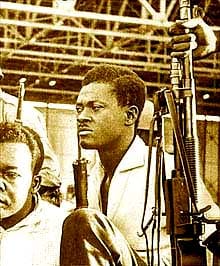by Mumia Abu-Jamal

Whenever I read of economic or ethnic strife in any part of Africa, I’m reminded of Dr. Frantz Fanon, the ethno-psychiatrist born in the Caribbean island of Martinique, who became a revolutionary, working on behalf of the Algerian Revolution, and writer of the masterpiece, “The Wretched of the Earth” (1966).
Fanon’s work was widely read on three continents and is still worthy of study, not least because the insightful thinker predicted how African rulers would rule if they didn’t unite the continent’s various peoples and failed to develop truly independent and socialist governing systems.
Many African post-colonial leaders, trained as they were in Eurocentric schools, sought to replicate such theories in African societies which could only result in disaster. Fanon is cutting when he describes the role of these Eurocentric African leaders who were attempting to recreate little pieces of Europe in their former colonies:
“In underdeveloped countries, we have seen that no true bourgeoisie exists; there is only a sort of little greedy caste, avid and voracious, with the mind of a huckster, only too glad to accept the dividends that the former colonial power hands out to it. This get-rich-quick middle class shows itself incapable of great ideas or of inventiveness. It remembers what it has read in European textbooks and imperceptibly it becomes not even the replica of Europe, but its caricature.”
When leaders were trained in capitalist colonizing economic theory, the most important lesson they learned was how to recreate colonialism, not to destroy it.
Many African nations have been riven by deadly and destructive ethnic clashes, such as Kenya, Nigeria, Rwanda, Mauritania and beyond.
Fanon wrote in “Wretched” that the “national bourgeoisie … which has totally assimilated colonialist thought in its most corrupt form, takes over from the Europeans and establishes in the continent a racial philosophy which is extremely harmful for the future of Africa.”
Thus, long inculcated into the European practice of “divide and conquer,” African leaders exploit ethnic differences – so-called “tribalism” – to stir the pot between communities. So, Hutus fight Tutsis, Zulus fight Xhosas, Kalenjins fight Kikuyus and on and on, while communal unity seems like an unattainable mirage. While people think of their ethnic identities, few think of national identities, and fewer still think of what African unity really means.
Divided into clans, Africa remains ripe for the plucking by the new colonialists, who see it as a vast stealing ground, from which resources can be looted with relative ease.
Fanon foresaw this half a century ago. Nkrumah tried to organize against it. But, regrettably, we are where we are.
It is almost painful to read Fanon today, over 40 years after his publications (in English), so accurate and cutting is his analysis. Yet, the truth remains that many African states have Black presidents and prime ministers who preside over systems that are tied with a thousand chains to the old colonials powers, which continued under new management old exploitative relationships.
Indeed, in “Toward the African Revolution” (1967), Fanon wrote of the global significance of the imperialists’ murder of Patrice Lumumba, the first democratically elected president of the Congo:
“Africa must understand … that there will not be one Africa that fights against colonialism and another that attempts to make arrangements with colonialism … Our mistake, the mistake we Africans made, was to have forgotten that the enemy never withdraws sincerely. He never understands. He capitulates, but he does not become converted. Our mistake is to have believed that the enemy had lost his combativeness and his harmfulness. If Lumumba is in the way, Lumumba disappears. Hesitation in murder has never characterized imperialism. Look at Ben M’hidi, look at Moumie, look at Lumumba. Our mistake is to have been slightly confused in what we did. It is a fact that in Africa, today, traitors exist. They should have been denounced and fought. The fact that this is hard after the magnificent dream of an Africa gathered together unto itself and subject to the same requirements of true independence does not alter facts. … Let us be sure never to forget it; the fate of all of us is at stake in the Congo.”
‘Our mistake is to have believed that the enemy had lost his combativeness and his harmfulness. If Lumumba is in the way, Lumumba disappears. … Let us be sure never to forget it; the fate of all of us is at stake in the Congo.’ – Frantz Fanon
In February and March, several African states had food riots – or should we say “hunger riots”? Some countries have sold staples at lower costs in special stores. Other countries have reached almost apocalyptic levels of hyperinflation where their currency is virtually worthless.
In general – at least as of several months ago – the following were equivalent to one U.S. dollar: in Algeria, 65 dinars; in Cote d’Ivoire, 420 francs; in Nigeria, 118 nairas; in Tanzania, 1,396 shillings; in Malawi, 140 kwacha. Only in one African country, Ghana, was its New Cedi equal to a dollar.
Half a century after most African states gained independence, and the continent is still a social, economic and political basket case. Fanon, if he were still alive, would weep.
© Copyright 2008 Mumia Abu-Jamal. Read Mumia’s latest book, “We Want Freedom: A Life in the Black Panther Party,” winner of the 2005 People’s Choice Award, available from South End Press, or (800) 533-8478. Keep updated by reading Action Alerts at www.mumia.org and www.moveorg.net. To download mp3s of Mumia’s commentaries, visit www.prisonradio.org or www.fsrn.org. For recent interviews with Mumia, visit www.blockreportradio.com. Encourage the media to publish and broadcast Mumia’s commentaries and interviews to inspire progressive movement and help call attention to his case. Send our brotha some love and light at: Mumia Abu-Jamal, AM 8335, SCI-Greene, 175 Progress Dr., Waynesburg PA 15370.





